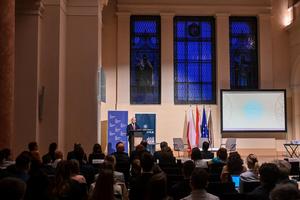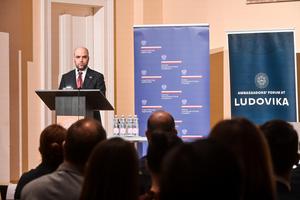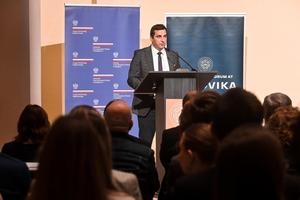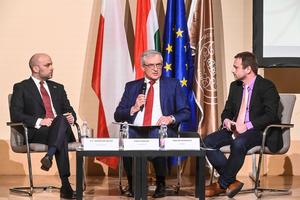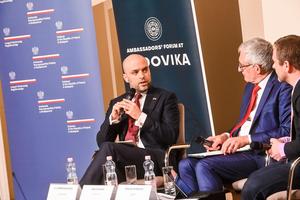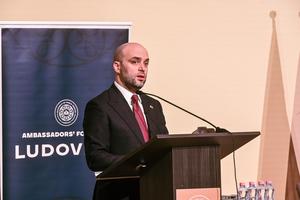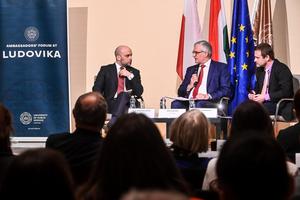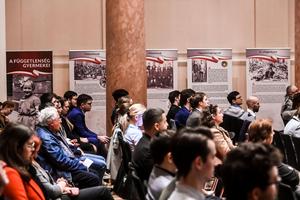As part of the Ludovika Ambassadors’ Forum, H.E. Sebastian Kęciek, Ambassador of the Republic of Poland in Budapest, gave a lecture entitled "Poland in the Face of a Changing World" on 21st of March, 2023 in the Saint Ladislaus Chapel of the Ludovika Main Building, which was followed by a round table discussion.
After the welcoming words of Judit Galambos, advisor of the Regional Cooperation Department of the Rectors Advisory Office, the rector of the University of Public Service (UPS) greeted the participants. Gergely Deli explained that the Ludovika Ambassadors’ Forum as a series of events is an important tool for the university's internationalization, through which students can look into the background of ambassadors’ work and get to know the main elements of the foreign policy of the invited country. In connection with the Hungarian-Polish friendship, he mentioned the daughter of the Hungarian King Louis the Great, Saint Hedvig (Jadwiga of Poland), who became Queen of Poland; about the University of Cracow, founded in 1364, which was the main educational centre of the region, and about the rich and meaningful relations between the universities of the two countries. Another important cooperation format is the so-called Synergia program: the aim of this EU project is to create an experience exchange network for senior public officers from Central and Eastern Europe. Gergely Deli also indicated the diversity and richness of bilateral cooperation by listing a number of professional programs recently organized by the UPS.
Afterwards, Ambassador Sebastian Kęciek held his keynote speech. He started his work in Budapest during a busy period: he took office after the Russian-Ukrainian war broke out, right after the Hungarian parliamentary elections. "We woke up to a new reality in February last year, but the direction of Polish foreign policy is clear: support for Ukraine against Russian aggression," he stated. This is despite the fact that a significant Polish minority lives in Ukraine, not in one block like the Hungarians, but spread around the whole country - the Minority Education Law is, therefore, unfavourable for them as well. We are still working with the Ukrainian side to find a solution, a compromise on this issue – he said. "So why did we decide to give Ukraine bilateral aid worth 1.5% of our GDP - the most of all countries in the world? Why did we take in 1.5 million refugees who found a safe place in our homes? Why did we donate military equipment, including tanks, worth €3 billion? The answer is simple: because we know Russia”, Ambassador said. He referred to the words of former President of the Republic Lech Kaczyński, who said in Tbilisi in 2008 during the Russo-Georgian war: "Today Georgia, tomorrow Ukraine, then the Baltic states, and maybe one day, my country, Poland will be next." And then in 2014 the annexation of Crimea took place, and Sebastian Kęciek also mentioned the politically motivated murders in Russia.
The ambassador also gave a detailed description of the most important steps taken in the recent period concerning Polish energy security, as a result of which the country has now completely separated itself from Russian energy sources. In connection with similar steps, we are ready to support Hungary as well, he noted. We believe that we can work together in many areas - he also referred to the cooperation of the Bucharest Nine. It is worth joining forces if only because our region has significant economic potential within the Union: 14 per cent of the population lives here, we have a skilled workforce, and the GDP is growing dynamically, so it is no wonder that the value of foreign capital investments (FDI) has also increased greatly in the past period.
In the meantime, the Poles are also adversely affected by the fact that they did not have access to the resources of the EU recovery fund, so the two countries are therefore on a common platform in this regard. The demographic difficulties are also similar. “Some of the challenges are the same, and economic and social relations remain strong between the two countries. I believe that the friendship between our people is deeper and stronger than political differences. In our rapidly changing world, strengthening NATO and security is a strategic goal," concluded Sebastian Kęciek, expressing his hope that we will emerge from the current situation more united and in greater solidarity than before.
The lecture was followed by a round table discussion, in which Ambassador Iván Gyurcsík, rector’s advisor for regional cooperation, asked Sebastian Kęciek and historian Miklós Mitrovits, a senior scientific associate of the Institute for Central European Studies of UPS. Regarding the roots of Polish-Hungarian friendship, Miklós Mitrovits mentioned three pillars: the common cultural-historical heritage; the geopolitical determination resulting from the geographical location between the Russian-German territories, and the independence struggle that appeared from time to time in the course of history, in which the two peoples mutually supported each other. These connections can be observed from the Middle Ages until the change of regime, the latter event being largely inspired by the operation of the Polish Solidarity movement.
Speaking of Ukrainian-Polish relations, it was said that in 2012, they also jointly organized the European Football Championship in order to strengthen the relationship between the two countries. The slogan at that time - Creating History Together - has now been given a new look. The ambassador admitted: the relationship between the two countries was not always free of tensions, and it is not even today because of the situation of minorities in Ukraine. However, the war changed many things, he added. Last year Ukraine enacted a law on the establishment of legal and social guarantees for Polish citizens residing on the territory of Ukraine, as well as implementing acts for this law.
Miklós Mitrovits drew attention to the fact that the Poles and the Baltic states have been warning about the Russian threat since 2008, and in 2014 it became clear that there was a reason. Warsaw, the historian said, deeply understands Russian imperialism, no wonder they were the first to help Ukraine when the war broke out. Currently, Polish-Ukrainian relations are closer than ever before.
Poland's energy independence from Russia was discussed during the conversation. In this regard, the ambassador said: a significant part of the country's energy imports came from the Russians 15 years ago - and it was not cheap, he pointed out. So they constantly tried to get rid of Russian gas, although no one believed them when they said that this was the right direction, because the geopolitical situation would change. The war then accelerated the events: at the time of its outbreak, Poland was not yet completely independent of Russian gas, but thanks to numerous bilateral co-operations, this has now been achieved. Hungary has no sea, so it is in a different situation, but there are good examples to follow in this regard, for example, the Czechs are moving towards LNG with the help of the Dutch. We encourage Hungary to diversify, and Hungary can also count on Poland's support in this, Sebastian Kęciek said.
In connection with regional cooperation, Miklós Mitrovits predicted the strengthening of the role of the Bucharest Nine (which was created in the wake of Russian aggression) and the Three Seas Initiative is becoming increasingly important in the field of energy carriers.
At the end of the round-table discussion the Ambassador informed the audience that on 23rd of March, on the occasion of the Polish-Hungarian Friendship Day, a Polish delegation will visit our country in order to maintain good relations. Sympathy towards the Hungarians can still be felt in Polish society, but overall there is currently more to be done than before.
Text: Lilla Kovács, ludovika.hu
Photo: Dénes Szilágyi
